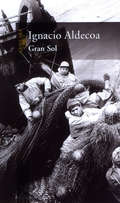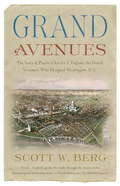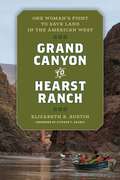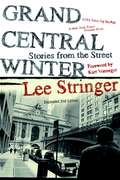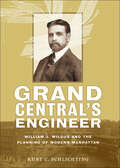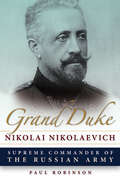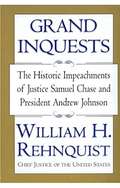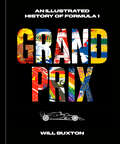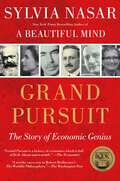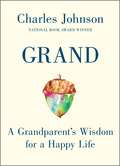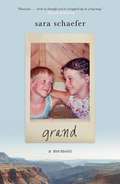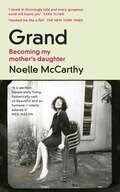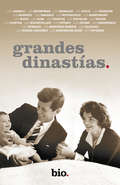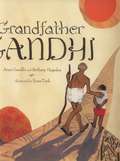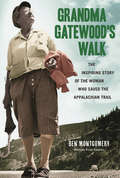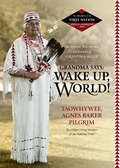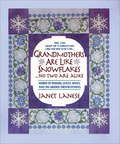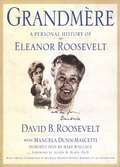- Table View
- List View
Gran Sol (Galería Literaria Ser.)
by Ignacio AldecoaEn alta mar las fuerzas naturales se oponen a los hombres con extrema crudeza. Esta realidad aparece retratada en una novela ya clásica de nuestra literatura, a veces triste y siempre auténtica, capaz de dignificar la soledad y la miseria. Ignacio Aldecoa escribió Gran Sol después de compartir la intensa experiencia de la pesca de altura con los marineros del Cantábrico. Testigo del sacrificio y la pobreza, consigue acercarnos con singular talento su día a día, sus conflictos laborales, sus dificultades y sus conversaciones. El íntimo vínculo entre los trabajadores del mar y la naturaleza queda al descubierto mediante un lenguaje luminoso y colorista que construye una estructura literaria de maestría indiscutible.
Grand Avenues: The Story of Pierre Charles l'Enfant, the French Visionary Who Designed Washington, D.C.
by Scott W. BergIn 1791, shortly after the United States won its independence, George Washington personally asked Pierre Charles l'Enfant--a young French artisan turned American revolutionary soldier who gained many friends among the Founding Fathers--to design the new nation's capital. L'Enfant approached this task with unparalleled vigor and passion; however, his imperious and unyielding nature also made him many powerful enemies. After eleven months, Washington reluctantly dismissed l'Enfant from the project. Subsequently, the plan for the city was published under another name, and l'Enfant died long before it was rightfully attributed to him. Filled with incredible characters and passionate human drama, Scott W. Berg's deft narrative account of this little-explored story in American history is a tribute to the genius of Pierre Charles l'Enfant and the enduring city that is his legacy.
Grand Canyon to Hearst Ranch: One Woman's Fight to Save Land in the American West
by Elizabeth AustinFinalist for the 2020 WILLA Literary Award, Creative NonfictionInspired by her first breathtaking trip in the Grand Canyon, Harriet Hunt Burgess dedicated her life to saving land for future generations. Beginning in the 1970s, she persevered through four decades—overcoming daunting obstacles and taking extraordinary risks—to conserve hundreds of thousands of acres of land in the American West.Without Burgess, iconic and irreplaceable landscapes like the Lake Tahoe region and the California coast would be much different today. As Harriet Burgess once explained, &“The land we save is our legacy. It&’s what we give to our children.&” The Grand Canyon was the catalyst for Harriet&’s conservation mission and the spark for Grand Canyon to Hearst Ranch. Author Elizabeth Austin has interwoven her own exhilarating and life-changing dory trip through the depths of the Grand Canyon with the compelling story of Harriet&’s early life and five of her most significant conservation achievements as founder-president of the American Land Conservancy.
Grand Central Winter: Stories from the Street
by Lee StringerWhether Lee Stringer is describing "God's corner" as he calls 42nd Street, or his friend Suzy, a hooker and "past due tourist" whose infant child he sometimes babysits, whether he is recounting his experiences at Street News, where he began hawking the newspaper for a living wage, then wrote articles, and served for a time as muckraking senior editor, whether it is his adventures in New York's infamous Tombs jail, or performing community service, or sleeping in the tunnels below Grand Central Station by night and collecting cans by day, this is a book rich with small acts of kindness, humor and even heroism alongside the expected violence and desperation of life on the street. There is always room, Stringer writes, "amid the costume" jewel glitter...for one more diamond in the rough."Two events rise over Grand Central Winter like sentinels: Stringer's discovery of crack cocaine and his catching the writing bug. Between these two very different yet oddly similar activities, Lee's life unwound itself, during the 1980s, and took the shape of an odyssey, an epic struggle to find meaning and happiness in arid times. He eventually beat the first addiction with help from a treatment program. The second addiction, writing, has hold of him still.Among the many accomplishments of this book is that Stringer is able to convey something of the vitality and complexity of a down--and--out life. The reader walks away from it humming its melody, one that is more wise than despairing, less about the shame we feel when confronted with a picture of those less fortunate, and more about the joy we feel when we experience our shared humanity.
Grand Central's Engineer: William J. Wilgus and the Planning of Modern Manhattan (The Johns Hopkins University Studies in Historical and Political Science #130)
by Kurt C. SchlichtingFew people have had as profound an impact on the history of New York City as William J. Wilgus. As chief engineer of the New York Central Railroad, Wilgus conceived the Grand Central Terminal, the city’s magnificent monument to America’s Railway Age. Kurt C. Schlichting here examines the remarkable career of this innovator, revealing how his tireless work moving people and goods over and under Manhattan Island’s surrounding waterways forever changed New York’s bustling transportation system.After his herculean efforts on behalf of Grand Central, the most complicated construction project in New York’s history, Wilgus turned to solving the city’s transportation quandary: Manhattan—the financial, commercial, and cultural hub of the United States in the twentieth century—was separated from the mainland by two major rivers to the west and east, a deep-water estuary to the south, and the Harlem River to the north.Wilgus believed that railroads and mass transportation provided the answer to New York City’s complicated geography. His ingenious ideas included a freight subway linking rail facilities in New Jersey with manufacturers and shippers in Manhattan, a freight and passenger tunnel connecting Staten Island and Brooklyn, and a belt railway interconnecting sixteen private railroads serving the metropolitan area. Schlichting’s deep passion for Wilgus and his engineering achievements are evident in the pages of this fascinating work. Wilgus was a true pioneer, and Schlichting ensures that his brilliant contributions to New York City’s transportation system will not be forgotten.Praise for Schlichting's Grand Central Terminal"Grand Central Terminal is celebrated for its Beaux-Arts style, but Kurt C. Schlichting looks behind the facade to see the hidden engineering marvels."—New York Times Book Review"His study peels away our contemporary expectations and experiences and reveals the layers of history and acts of men that served as the foundation for this great structure."—H-Urban, H-Net Review"The most detailed account yet of one of the most important events in the history of 20th-century architecture, railroad development, and city building."—Choice"In his detailed accounts of the fiscal, stylistic, and engineering decisions that went into the creation of... Grand Central Terminal, Schlichting clearly shows both how energetic and talented all of the people involved were and how dramatically they altered this central portion of New York City."—Journal of the Society of Architectural Historians"Ably tells the story of the New York rail system's most active and visible symbol: the architectural and engineering masterpiece, with its grand public concourse, in the heart of Midtown."—New Scientist
Grand Duke Nikolai Nikolaevich: Supreme Commander of the Russian Army (NIU Series in Slavic, East European, and Eurasian Studies)
by Paul RobinsonGrand Duke Nikolai Nikolaevich Romanov (1856–1929) was a key figure in late Imperial Russia, and one of its foremost soldiers. At the outbreak of World War I, his cousin, Tsar Nicholas II, appointed him Supreme Commander of the Russian Army. From 1914 to 1915, and then again briefly in 1917, he was commander of the largest army in the world in the greatest war the world had ever seen. His appointment reflected the fact that he was perhaps the man the last Emperor of Russia trusted the most. At six foot six, the Grand Duke towered over those around him. His fierce temper was a matter of legend. However, as Robinson's vivid account shows, he had a more complex personality than either his supporters or detractors believed. In a career spanning 50 years, the Grand Duke played a vital role in transforming Russia's political system. In 1905, the Tsar assigned him the duty of coordinating defense and security planning for the entire Russian empire. When the Tsar asked him to assume the mantle of military dictator, the Grand Duke, instead of accepting, persuaded the Tsar to sign a manifesto promising political reforms. Less opportunely, he also had a role in introducing the Tsar and Tsarina to the infamous Rasputin. A few years after the revolution in 1917, the Grand Duke became de facto leader of the Russian émigré community. Despite his importance, the only other biography of the Grand Duke was written by one of his former generals in 1930, a year after his death, and it is only available in Russian. The result of research in the archives of seven countries, this groundbreaking biography—the first to appear in English—covers the Grand Duke's entire life, examining both his private life and his professional career. Paul Robinson's engaging account will be of great value to those interested in World War I and military history, Russian history, and biographies of notable figures.
Grand Hotel Abyss: The Lives of the Frankfurt School
by Stuart JeffriesThis brilliant group biography asks who were the Frankfurt School and why they matter todayIn 1923, a group of young radical German thinkers and intellectuals came together to at Victoria Alle 7, Frankfurt, determined to explain the workings of the modern world. Among the most prominent members of what became the Frankfurt School were the philosophers Walter Benjamin, Theodor Adorno, Max Horkheimer, and Herbert Marcuse. Not only would they change the way we think, but also the subjects we deem worthy of intellectual investigation. Their lives, like their ideas, profoundly, sometimes tragically, reflected and shaped the shattering events of the twentieth century.Grand Hotel Abyss combines biography, philosophy, and storytelling to reveal how the Frankfurt thinkers gathered in hopes of understanding the politics of culture during the rise of fascism. Some of them, forced to escape the horrors of Nazi Germany, later found exile in the United States. Benjamin, with his last great work--the incomplete Arcades Project--in his suitcase, was arrested in Spain and committed suicide when threatened with deportation to Nazi-occupied France. On the other side of the Atlantic, Adorno failed in his bid to become a Hollywood screenwriter, denounced jazz, and even met Charlie Chaplin in Malibu.After the war, there was a resurgence of interest in the School. From the relative comfort of sun-drenched California, Herbert Marcuse wrote the classic One Dimensional Man, which influenced the 1960s counterculture and thinkers such as Angela Davis; while in a tragic coda, Adorno died from a heart attack following confrontations with student radicals in Berlin.By taking popular culture seriously as an object of study--whether it was film, music, ideas, or consumerism--the Frankfurt School elaborated upon the nature and crisis of our mass-produced, mechanised society. Grand Hotel Abyss shows how much these ideas still tell us about our age of social media and runaway consumption.From the Hardcover edition.
Grand Inquests: The Historic Impeachments Of Justice Samuel Chase And President Andrew Johnson
by William H. RehnquistRecounts two precedent-setting impeachment cases that strengthened the concept of separation of powers and further defined the institutions of American government
Grand Prix: An Illustrated History of Formula 1
by Will BuxtonNEW YORK TIMES BESTSELLER • A thrilling illustrated history of Formula 1 racing, from its fascinating origins and inner workings to the top drivers of the twentieth century and today, by a celebrated motorsports broadcaster and star of Formula 1: Drive to Survive&“A valuable and welcome addition to the library of any lifelong F1 fan, as well as for any curious individual new to the world of F1.&”—Mario Andretti Over its seventy-plus years of history, Formula 1 racing has grown from a niche motorsport with just a few events per season into a global phenomenon followed by more than a billion fans. With just twenty drivers competing at speeds of over 220 miles per hour on more than twenty of the world&’s most glamorous and challenging racetracks, Formula 1 is the ultimate test of machine and humankind. To become a champion means to be counted among the most elite athletes the world has ever known.As the lead commentator on Netflix&’s breakout series Formula 1: Drive to Survive, Will Buxton has emerged as the most prominent journalist covering the sport for the new generation of fans. Grand Prix chronicles the past, present, and future of F1 in an engaging and easily digestible format. You&’ll be introduced to historical heroes, such as Formula 1&’s very first world champion, Giuseppe Farina, through every decade and every champion of the sport, including the iconic Lewis Hamilton and reigning champion Max Verstappen. You&’ll meet the drivers these great champions did battle with and discover the teams they raced for and the tracks they mastered. Packed with incredible stories and epic races, this captivating collection also contains features on every aspect of the sport today, along with how modern teams operate from their factories to race weekend garage setups, car design, the development of the sport through the lens of automotive evolution and safety, the art of the pitstop, and the future of motor racing.Filled with immersive and engaging information with illustrations as dynamic and bold as the sport itself, Grand Prix is the definitive introduction to the world's fastest sport.
Grand Pursuit: The Story of Economic Genius
by Sylvia NasarIn a sweeping narrative, the author of the megabestseller A Beautiful Mind takes us on a journey through modern history with the men and women who changed the lives of every single person on the planet. It’s the epic story of the making of modern economics, and of how economics rescued mankind from squalor and deprivation by placing its material fate in its own hands rather than in Fate. Nasar’s account begins with Charles Dickens and Henry Mayhew observing and publishing the condition of the poor majority in mid-nineteenth-century London, the richest and most glittering place in the world. This was a new pursuit. She describes the often heroic efforts of Marx, Engels, Alfred Marshall, Beatrice and Sydney Webb, and the American Irving Fisher to put those insights into action—with revolutionary consequences for the world. From the great John Maynard Keynes to Schumpeter, Hayek, Keynes’s disciple Joan Robinson, the influential American economists Paul Samuelson and Milton Freedman, and India’s Nobel Prize winner Amartya Sen, she shows how the insights of these activist thinkers transformed the world—from one city, London, to the developed nations in Europe and America, and now to the entire planet. In Nasar’s dramatic narrative of these discoverers we witness men and women responding to personal crises, world wars, revolutions, economic upheavals, and each other’s ideas to turn back Malthus and transform the dismal science into a triumph over mankind’s hitherto age-old destiny of misery and early death. This idea, unimaginable less than 200 years ago, is a story of trial and error, but ultimately transcendent, as it is rendered here in a stunning and moving narrative.
Grand Slam Man
by Dan LydiateWhen Wales beat France to clinch the 2012 Six Nations Championship Grand Slam - one player stood out from the rest of the field. A powerful presence on the pitch, Dan Lydiate, the 6ft 4in fearless farmer's son from Llandrindod Wells truly deserved the title Player of the Tournament. In Grand Slam Man, the heroic Welsh flanker reflects on his comeback from a broken neck in 2008 to become the hero of Wales's 2012 Grand Slam success. He also reveals his thoughts on the Australia tour, his love of tackling, his life on the farm and his British Lions dream.
Grand Slam Man (Quick Reads Ser.)
by Dan LydiateWhen Wales beat France to clinch the 2012 Six Nations Championship Grand Slam – one player stood out from the rest of the field.A powerful presence on the pitch, Dan Lydiate, the 6ft 4in fearless farmer’s son from Llandrindod Wells truly deserved the title Player of the Tournament.In Grand Slam Man, the heroic Welsh flanker reflects on his comeback from a broken neck in 2008 to become the hero of Wales’s 2012 Grand Slam success. He also reveals his thoughts on the Australia tour, his love of tackling, his life on the farm and his British Lions dream.
Grand Slam Man (Quick Reads)
by Dan LydiateWhen Wales beat France to clinch the 2012 Six Nations Championship Grand Slam – one player stood out from the rest of the field.A powerful presence on the pitch, Dan Lydiate, the 6ft 4in fearless farmer’s son from Llandrindod Wells truly deserved the title Player of the Tournament.In Grand Slam Man, the heroic Welsh flanker reflects on his comeback from a broken neck in 2008 to become the hero of Wales’s 2012 Grand Slam success. He also reveals his thoughts on the Australia tour, his love of tackling, his life on the farm and his British Lions dream.
Grand: A Grandparent's Wisdom for a Happy Life
by Charles JohnsonNational Book Award winner and MacArthur Genius Fellow Charles Johnson reflects on the joys of being a grandparent in this warm, inspiring collection of wisdom and life lessons—the ideal gift for any new parent or grandparentAn award-winning novelist, philosopher, essayist, screenwriter, professor and cartoonist, Charles Johnson has held numerous impressive titles over the course of his incomparable career. Now, for the first time, with his trademark wisdom and philosophical generosity, he turns his attention to his most important role yet: grandparent.In Grand, Johnson shares stories from his life with his six-year-old grandson, Emery, weaving in advice and life lessons that stand the test of time. “Looking at the problems I see in the world around me,” Johnson writes, “I realize that there are so many things I want to say to him about the goodness and beauty that life offers. What are the perennial truths that I can impart to Emery that might make his journey through life easier or more rewarding?” Johnson shares these truths and more, offering profound meditations on family, race, freedom and creativity.Joyful, lucid and deeply comforting, Grand is Johnson at his most accessible and profound, an indispensable compendium for new grandparents and growing grandchildren alike, from one of America’s most revered thinkers.
Grand: A Memoir
by Sara SchaeferFor fans of Mennonite in a Little Black Dress and Let&’s Pretend This Never Happened, comedian and Emmy award–winning writer Sara Schaefer&’s hilariously honest memoir follows Sara&’s trip through the Grand Canyon with her sister that causes her to reflect on her childhood and the scandal that changed her family forever.When Sara Schaefer is in first grade, her father warns her to always tell the truth because one lie leads to another and soon you will find yourself in a hole you can&’t escape. A few years later, the Schaefer family is completely upended when it&’s revealed that their grand life is based on a lie. Her parents become pariahs in their upper middle class community and go from non-religious people to devout church members. The idea of good and evil as binary, opposed forces is drilled into Sara and it becomes the perfect framework on which to build her anxiety and increasingly-obsessive thoughts. The year she turns forty, Sara decides to take each member of her family on a one-on-one vacation culminating with a whitewater rafting journey through the Grand Canyon with her younger sister. The only problem is she&’s terrified of rafting. Along the way, she grapples with unresolved grief over the death of her mother and the family scandal that changed the trajectory of her life. Heartfelt, candid, and witty, Grand is a story about family, identity, and struggling to make something of yourself. Sara deconstructs her struggles with anxiety and depression, what it means to be a good person, and the radically discordant stories we tell ourselves and share with the world.
Grand: Becoming My Mother’s Daughter
by Noelle McCarthy‘A natural storyteller with a Sedaris-like eye for black humour. There are sharp splinters of comic relief … compelling and nuanced.” Edel Coffey, Irish Times Quick-witted, charismatic and generous; angry, vicious and hurt; in pubs all over Cork City, Noelle McCarthy's mother Carol rages against her life and everything she has lost. Soon after leaving college, in the early years of the millennium, Noelle flees. Even on the other side of the world, with fame and success within her grasp, Noelle cannot escape an appetite for self-destruction. Life spirals out of control until she too is in danger of losing everything. At thirty, she pulls back from the brink.Over a decade later, Carol is dying. Finally, it seems, mother and daughter will make peace. Except Carol has no interest in admitting her own mortality - she will die as she lived, entirely on her own terms. If there is any reckoning to be done between past and present, Noelle will be doing it on her own.Grand is the deeply moving and surprisingly funny outcome of Noelle's yearning to understand her mother, and to make sense of their lives, together and apart. Most of all, it is a dazzlingly honest memoir about becoming a modern woman._____2023 Non-Fiction Winner at the Ockham New Zealand Book Awards‘Exquisitely written … profoundly moving. And like all great memoirs it is hilarious in parts. If, like, me, you love the personal essays of Sinéad Gleeson and Emilie Pine, you’ll adore this’ Sunday Independent'Desperately funny, hysterically sad, so beautiful and so humane. All of life is in it' Meg Mason'Hooked me like a fish' New York Times‘A really vivacious account of frayed family relationships across the decades and around the world’ Financial Times Podcast
Grandes dinastías
by BioEl apasionante relato de las 25 dinastías más famosas de la historia. Dinero, poder, belleza, sexo, lujo, glamour, escándalo, tragedia y éxito... la historia real y emotiva de las veinticinco familias más famosas del siglo XX, avalada por la calidad y el rigor de Bio, el canal de las celebrities. ¿Cómo se levantaron de la nada las grandes fortunas de este siglo? ¿Qué sucedió en el seno de las míticas sagas de actores de Hollywood? ¿De dónde surgieron las firmas más influyentes del mundo de la moda? ¿Cuáles son las familias nobiliarias que han pervivido hasta nuestros días? En Grandes dinastías se relata con amenidad y rigor la emocionante historia de los emprendedores que construyeron imperios, crearon estilo, marcaron tendencia y alcanzaron las cotas más altas del reconocimiento público. La aristocracia, la banca, la política, la industria farmacéutica, el automovilismo, la altacostura, el cine o incluso la venta de alcohol han sido algunos ámbitos en los que las sagas familiares más poderosas del planeta han crecido para, en ocasiones, caer estrepitosamente en desgracia. De los Kennedy a los Onassis, de los Gucci a los Versace, de los Rockefeller a los Trump, de los Alba a los Rivera-Ordóñez# un entretenido recorrido por las luces y las sombras, los triunfos y los fracasos de veinticinco legendarias familias que han definido el mundo político, social y económico en que vivimos, con el sello de Bio, el canal de televisión que muestra la vida de las celebrities más importantes del mundo.
Grandfather Gandhi
by Bethany Hegedus Arun Gandhi Evan Turk<p>Mahatma Gandhi’s grandson tells the story of how his grandfather taught him to turn darkness into light in this uniquely personal and vibrantly illustrated tale that carries a message of peace. <p>How could he—a Gandhi—be so easy to anger? <p>One thick, hot day, Arun Gandhi travels with his family to Grandfather Gandhi’s village. <p>Silence fills the air—but peace feels far away for young Arun. When an older boy pushes him on the soccer field, his anger fills him in a way that surely a true Gandhi could never imagine. Can Arun ever live up to the Mahatma? Will he ever make his grandfather proud? <p>In this remarkable personal story, Arun Gandhi, with Bethany Hegedus, weaves a stunning portrait of the extraordinary man who taught him to live his life as light. Evan Turk brings the text to breathtaking life with his unique three-dimensional collage paintings.</p>
Grandma Gatewood's Walk: The Inspiring Story of the Woman Who Saved the Appalachian Trail
by Ben MontgomeryEmma Gatewood was the first woman to hike the entire Appalachian Trail alone, as well as the first person--man or woman--to walk it twice and three times and she did it all after the age of 65. This is the first and only biography of Grandma Gatewood, as the reporters called her, who became a hiking celebrity in the 1950s and '60s. She appeared on TV with Groucho Marx and Art Linkletter, and on the pages of Sports Illustrated. The public attention she brought to the little-known footpath was unprecedented. Her vocal criticism of the lousy, difficult stretches led to bolstered maintenance, and very likely saved the trail from extinction. Author Ben Montgomery was given unprecedented access to Gatewood's own diaries, trail journals, and correspondence. He also unearthed historic newspaper and magazine articles and interviewed surviving family members and hikers Gatewood met along the trail. The inspiring story of Emma Gatewood illustrates the full power of human spirit and determination.
Grandma Moses: Painter of Rural America (Women of Our Time)
by Zibby OnealAlthough she did not start painting until she was nearly 80 years old, Grandma Moses became one of America's best-loved artists. She lived to be 101, painting until the last year of her life. Outspoken and witty, Grandma won admirers for her down-home attitude as much as for her beautiful paintings. Her primitive landscapes reflect an old country charm that Americans love to recall, just as Grandma Moses herself lived the simple lifestyle of earlier generations. Picture descriptions or captions included from picture pages.
Grandma Says: The Wisdom, Wit, Advice, and Stories of “Grandma Aggie”
by Agnes Baker PilgrimAgnes Baker Pilgrim, known to most as Grandma Aggie, is in her nineties and is the oldest living member of the Takelma Tribe, one of the Confederated Tribes of Siletz.A descendant of both spiritual and political tribal leaders, Grandma Aggie travels tirelessly around the world to keep traditions alive, to help those in need, and to be a voice for the voiceless, helping everyone to remember to preserve our Earth for animals and each other in a spiritual environment.Considered an excellent speaker, she has mesmerized her audience wherever she appears, and now her wit, wisdom, memories, advice, stories and spirituality have been captured for all to hear.Honored as a “Living Cultural Legend” by the Oregon Council of the Arts, Grandma Aggie here speaks about her childhood memories, about her tribe and her life as a child growing up in an area that often didn’t allow Indians and dogs into many public places, as well as about such contemporary issues as bullying, teen suicide, drugs and alcohol, Pope Francis, President Obama, water conservation, climate change, and much more. This is an amazing recording of one of the oldest and most important voices of the First Nation and of the world. Her stories and advice will mesmerize and captivate you, as well as provide a blueprint for how all the inhabitants of the earth can live together in harmony, spirituality, and peace.
Grandma's Gardens
by Chelsea Clinton Hillary ClintonFrom mother-daughter team Hillary Clinton and Chelsea Clinton comes a celebration of family, tradition and discovery, and an ode to mothers, grandmothers and the children they love.Grandma Dorothy shared her love of gardens with her daughter, Hillary, and her granddaughter, Chelsea. She taught them that gardens are magical places to learn, exciting spaces for discovery, quiet spots to spend time with family and beautiful areas to share stories and celebrate special occasions. But most of all, she taught them that in her gardens, her love grew and blossomed.In this inspiring and heartwarming mother-daughter story, Hillary Clinton and Chelsea Clinton team up to show readers how sharing the things we love with the people we love can create powerful, everlasting bonds between generations.Praise for Grandma's Gardens:"A deeply affectionate tribute to the bounty of nature and the love of gardening." --Publishers Weekly"Filled with mindfulness, the story inspires children to reflect on family and keep memories alive." --Booklist
Grandmothers Against the War: Getting Off Our Fannies And Standing Up For Peace
by Joan WileOne Person Can Make A Difference! Have you ever woken up in the middle of the night thinking, "I've got to DO something," but felt like you were just one person who couldn't bring about change? Well, Joan Wile woke up one night thinking she had to do something about the war in Iraq. Little did she know how far she would go. . . Joan founded Grandmothers Against the War in 2003. In this outspoken memoir, she tells the amazing story of the courageous, spunky women who stood up for their beliefs and refused to back down. From getting arrested and jailed in Times Square, to marching to Washington, D.C., to speaking and performing in Europe, these activists are sure to inspire you with their hope and determination against all odds. It's never too late to change your life--and take action!
Grandmothers are Like Snowflakes ... No Two are Alike
by Janet LaneseWhen a child is born, a miracle happens -someone becomes a grandmother! For first-time grandmas, beloved veterans, or grandmas-in-waiting, this warm, wonderful book captures all the joy and humor of one of a woman's most life-altering experiences. Heartwarming observations from such famous names as Margaret Mead, Jane Russell, and Margaret Thatcher; poems to copy and stick on the refrigerator; words of advice to "accidentally" leave on a daughter-in-law's kitchen table, suggestions to smooth the rough times or increase the joy, it's all here to read and treasure. Don't miss. . . Special things only a grandmother can do Family history a grandmother can pass on A precious gift every child needs from a grandmother Secret satisfactions a grandmother feels How a grandmother can act even wiser than she is And more!
Grandmère
by David B. Roosevelt Manuela Dunn-MascettiUntil her death when he was 20, David B. Roosevelt enjoyed a close relationship with his grandmother Eleanor Roosevelt. Now David shares personal family stories and photographs that show Eleanor as she really was.
